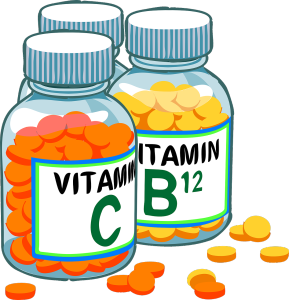As a Registered Dietitian, we have always been taught to teach our patients that food should be your primary source of nutrients. As a child I was told, as most children were, to eat my fruits and vegetables first. This seemed to never be an issue in my house, but the message still resonates with me today. As our awareness of the health benefits of fruits and vegetables have only grown, why is it that the supplement industry has grown even bigger?
 It is true that most of our vitamins and minerals come from the foods we eat, but in some cases this may just not be enough. For example, the average person living in the Northeast during the Winter months may have a low Vitamin D level. Vitamin D mostly comes from the sun, which is sparse in freezing temperatures. In other cases, some vitamins may be needed in higher doses due to previous surgeries — such as in some bariatric surgeries.
It is true that most of our vitamins and minerals come from the foods we eat, but in some cases this may just not be enough. For example, the average person living in the Northeast during the Winter months may have a low Vitamin D level. Vitamin D mostly comes from the sun, which is sparse in freezing temperatures. In other cases, some vitamins may be needed in higher doses due to previous surgeries — such as in some bariatric surgeries.
Before rushing to take every vitamin under the sun, I would recommend getting a vitamin panel done. Check to see which vitamins you are actually deficient in before going ahead and taking it. Although rare, vitamin toxicities do occur, and taking an excessive amount of unnecessary vitamins could result in this.
How do you know which vitamins are actually needed?
Assessing Your Needs for Supplements: What Should You Know?
Keep Your Diet Well Balanced
Are you eating the rainbow? Aim for a variety of color on your plate as a guide to having the bare minimum of your vitamin and mineral needs met. A plate filled with only white flower will not only lead to weight gain, but also is deficient in most nutrients. I realize that it is not always possible to have a consistent spectrum of colors on your plate and therefore, you may want to consider taking a simple multivitamin as an insurance policy. To learn more about multivitamins, please CLICK HERE.
Are You Even Deficient?
As previously stated, it is best to know what you are low in prior to taking any supplementation. Why take a bunch of pills that are not actually necessary? I recommend going for a nutrition panel and discussing with your Registered Dietitian or Doctor what, if any supplements, need to be taken.
Should I be Taking these Supplements as a Preventative?
In some cases, it may be a good idea to take vitamins as a preventative measure. One situation that comes to mind is a female in her early 20’s that does not consume any dairy. This particular person may benefit from taking Calcium as you reach your peak bone mass at age 30 and dairy is one of the best sources of calcium. However, specific vitamin replacement should be assessed as a case-by-case basis. Discuss with your Physician or Registered Dietitian if you feel that you may need to take certain vitamins as a preventative measure.
Ultimately, you want to assess the need of taking vitamins before going ahead and doing so. Speak with your Registered Dietitian and/or Doctor if any deficiencies warrant taking them. And always remember to eat your fruits and vegetables first!
 About the Author:
About the Author:
Leah Kaufman is a Registered Dietitian at the NYU Langone Weight Management Program. She is a graduate of Columbia University with a Masters of Science in Nutrition Education. Leah works primarily with the bariatric and nonsurgical weight management program to help patients
meet their nutrition related and weight-loss goals through nutrition counseling.






